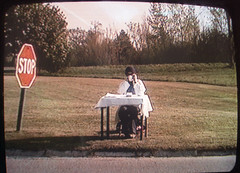Fame in the Kitchen
R: You know, back in the 40's and 50' artists were more famous than they are now. For example, that Picasso was more recognized by people worldwide than, lets say, Kennedy.
B: What? Who doesn't know who Kennedy was?
R: Remember, I said in the world - not the U.S.
B: Ok, so then what you are equating with Fame is name recognition?
R: No, not necessarily -
B: - but that's what you are saying, and isn't it true? Everyone knows who Tom Cruise is, but does that make him any better? But then we aren't really discussing quality just magnitude. But no one can deny that Picasso was genuinely great -
R: Let me finish. Yes you are right. If Tom Cruise sucked as an actor would we know who he was -
B - well he does suck, but not as much as he could.
R: Somebody, in the beginning thought he was good or good looking - whatever - and somehow because that person thought so the rest of us continued to think that.
B: So if you have an artist who everybody just likes their work for whatever reason - well, does that alone get him famous?
R: No, because think of all the artists that you don't like, yet you recognize them for what they are.
B: Maybe fame is like currency in that it suffers from inflation over time. Maybe fame in the 40's carried a different social value than it does now. And of course the answer is yes, because back then people were famous because adults knew who they were not adolescents like we have now.
No, but really. What if we assigned data points to specific questions or aspects of fame and did a real statistical analysis? Try to really figure out if what you are saying is true - maybe artists WERE more famous than they are today. Or maybe there are just more people vying for that fame.
R: Yeah, ok. But there are so many things to look at -
B: - could you get me some more rice?
B: What? Who doesn't know who Kennedy was?
R: Remember, I said in the world - not the U.S.
B: Ok, so then what you are equating with Fame is name recognition?
R: No, not necessarily -
B: - but that's what you are saying, and isn't it true? Everyone knows who Tom Cruise is, but does that make him any better? But then we aren't really discussing quality just magnitude. But no one can deny that Picasso was genuinely great -
R: Let me finish. Yes you are right. If Tom Cruise sucked as an actor would we know who he was -
B - well he does suck, but not as much as he could.
R: Somebody, in the beginning thought he was good or good looking - whatever - and somehow because that person thought so the rest of us continued to think that.
B: So if you have an artist who everybody just likes their work for whatever reason - well, does that alone get him famous?
R: No, because think of all the artists that you don't like, yet you recognize them for what they are.
B: Maybe fame is like currency in that it suffers from inflation over time. Maybe fame in the 40's carried a different social value than it does now. And of course the answer is yes, because back then people were famous because adults knew who they were not adolescents like we have now.
No, but really. What if we assigned data points to specific questions or aspects of fame and did a real statistical analysis? Try to really figure out if what you are saying is true - maybe artists WERE more famous than they are today. Or maybe there are just more people vying for that fame.
R: Yeah, ok. But there are so many things to look at -
B: - could you get me some more rice?



0 Comments:
Post a Comment
<< Home